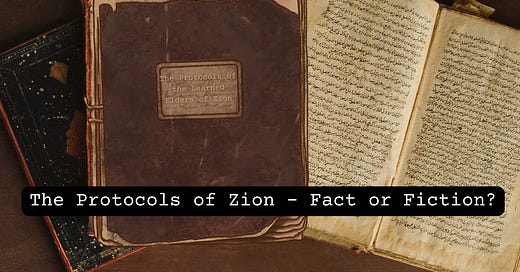Conspiracy theories have always been a part of human history, weaving tales of hidden truths and shadowy powers that challenge our understanding of the world. From ancient myths to modern online movements, these theories have the power to captivate, divide, and even mobilize entire communities. But what drives their enduring appeal? More importantly, how do they shape the societies in which they thrive?
In this continuing series, we delve into the world of conspiracy theories—exploring their origins, their psychological and cultural impact, and the way they influence everything from politics to social dynamics. Whether debunking long-held beliefs or uncovering the mechanisms that allow such ideas to spread, this series aims to shed light on the complexities and consequences of these pervasive narratives.
Exploring Controversies in Literature: The Protocols of Zion
In the realm of literature, certain texts have sparked debates, influenced ideologies, and ignited global controversies. One such text is The Protocols of the Learned Elders of Zion. This document has been alternately described as a historical blueprint for domination, a fabricated conspiracy theory, and a central text in the study of antisemitic propaganda. In a classic episode of Power of Prophecy, host Texe Marrs delved into the origins, implications, and global reactions to this contentious book.
This blog post provides an overview of the discussion, exploring the historical context, claims of authenticity, and broader societal implications of The Protocols of Zion. Whether you approach this topic as a curious reader or a critical thinker, understanding the arguments around this infamous text can offer insights into how literature influences perceptions, ideologies, and global discourse.
Historical Context of The Protocols
The Protocols of the Learned Elders of Zion first emerged in the early 20th century and was initially published in Russia. According to Marrs, the book was appended to a larger work titled The Great Within the Small by Sergius Nilus, a Russian Orthodox monk. The text purports to outline a secret plan for global domination orchestrated by Jewish leaders.
Over time, The Protocols gained notoriety, both as an alleged exposé of a conspiratorial framework and as a powerful tool of antisemitic propaganda. Marrs described the book’s dissemination and the fierce backlash it faced, noting that it has been banned in numerous countries. He emphasized how these bans have, paradoxically, increased its mystique and fueled debates over its authenticity.
The episode also explored the context of early 20th-century geopolitics, linking the book to the rise of communism in Russia and beyond. Marrs alleged that The Protocols provided insight into the ideological strategies employed during this turbulent period, arguing that the text’s predictions have remained eerily relevant in contemporary times.
The Authenticity Debate: Truth or Forgery?
Central to the controversy surrounding The Protocols is the question of its authenticity. Marrs discussed the text’s polarizing reception, highlighting how critics and proponents alike have scrutinized its origins. Critics, including Jewish organizations, argue that the document is a fabricated narrative designed to incite hatred. Proponents, on the other hand, claim that the text accurately predicts political and societal developments, suggesting it was crafted by individuals with insider knowledge of global strategies.
Marrs cited notable historical figures such as Henry Ford and Aleksandr Solzhenitsyn in his defense of the text’s significance. Ford famously remarked that the content of The Protocols “fits in with what is going on,” while Solzhenitsyn, described as the “conscience of the 20th century,” analyzed the text for its literary and ideological merit. According to Marrs, Solzhenitsyn believed that The Protocols contained elements of brilliance, describing it as a “master plan” that demonstrates extraordinary foresight, albeit written in a fragmented and flawed manner.
One of the most compelling points raised in the episode was the theory that parts of The Protocols were plagiarized from Maurice Joly’s 1864 work, Dialogue in Hell Between Machiavelli and Montesquieu. Marrs acknowledged similarities between the two texts but argued that such parallels do not diminish the significance or relevance of The Protocols. Instead, he posited that borrowing ideas is a common practice in literature and revolutionary texts.
Censorship and Suppression
A recurring theme in Marrs’ discussion was the widespread censorship of The Protocols. He argued that the efforts to ban or suppress the book have inadvertently amplified its intrigue. Marrs expressed concern over what he described as a global tendency toward censorship and control of controversial ideas, drawing parallels to historical regimes that sought to suppress dissenting literature.
The host shared examples of how publishers and individuals associated with The Protocols have faced threats and persecution. He noted that the text’s suppression began as early as 1905 and continued throughout the 20th century, with various governments and organizations seeking to restrict its availability. Marrs portrayed this censorship as indicative of the text’s potential impact, suggesting that its content poses a threat to those in positions of power.
Religious and Cultural Analysis
Marrs also explored the religious and cultural dimensions of The Protocols. He linked its content to Jewish texts such as the Kabbalah and Talmud, claiming that these writings provide a deeper understanding of the ideological underpinnings of The Protocols. According to Marrs, the symbolism within The Protocols aligns with certain concepts from Jewish mysticism, including the idea of a “great serpent” that traverses nations and culminates in global dominance.
This interpretation of The Protocols as a blueprint for religious, political, and economic domination has been one of the most contentious aspects of its legacy. Marrs encouraged listeners to examine these claims critically, urging them to explore the broader historical and cultural context in which such ideas emerged.
Implications for Society
One of the most thought-provoking aspects of the episode was Marrs’ assertion that The Protocols offers a warning for future societal developments. He argued that the text serves as both a cautionary tale and a call to vigilance, highlighting the potential consequences of unchecked power and ideological manipulation.
Marrs also drew connections between the themes of The Protocols and modern global issues, such as political corruption, economic inequality, and media control. By examining these parallels, he aimed to illustrate how the text’s content remains relevant in contemporary discourse.
A Call to Critical Engagement
As the episode concluded, Marrs issued a call to action for listeners to engage critically with The Protocols and similar controversial texts. He emphasized the importance of free speech and open debate in uncovering truths and fostering understanding. Marrs also encouraged readers to approach the text with an analytical mindset, considering both its historical context and its potential distortions.
Marrs framed his discussion as an effort to preserve intellectual freedom and challenge censorship. He argued that understanding controversial ideas, even those that provoke discomfort or disagreement, is essential for maintaining a free and informed society.
Final Thoughts
The Protocols of the Learned Elders of Zion remains one of the most polarizing texts in modern history. Whether viewed as a forgery, a prophetic document, or a tool of propaganda, its impact on literature, ideology, and global discourse is undeniable.
In this episode of Power of Prophecy, Texe Marrs provided a comprehensive exploration of the text’s history, authenticity, and implications. By examining the debates surrounding The Protocols, Marrs invited listeners to grapple with the complexities of controversial literature and its role in shaping societal narratives.
Ultimately, this discussion serves as a reminder of the power of ideas—both to illuminate truths and to perpetuate divisions. As readers and thinkers, our responsibility lies in approaching such texts with critical inquiry, seeking to understand their origins, significance, and lasting impact on the world.














Share this post